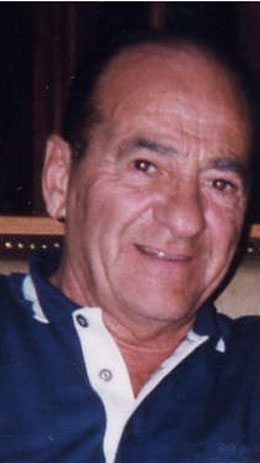
Established April 14, 1942
 |
American Ex-Prisoners of War
A not-for-profit, Congressionally-chartered veterans’ service organization advocating for former prisoners of war and their families.
Established April 14, 1942 |


Francis D. Scordino
|
||
| Last Name | First Name, Middle Init. | Nickname |
| Street Add. | City | State |
| Zip | Spouse | |
| Conflict | Branch of Service | Unit: |
| Theatre of Operation | Military Job | Where Captured |
| Date Captured | Time Interned | Camps |
| Date Liberated | Medals Received | Age at Capture |
| After the War ... | ||
Frank joined the at the age of 18 in 1943 and received his training at Camp Wheeler in Macon, Georgia. He was assigned to Bravo Company in the Army's 42nd Rainbow Infantry Division which saw extensive combat in Europe. PFC Scordino found his unit in the Ardennes forest, during the Battle of the Bulge,in December 1944. This was the last stand for the Nazis, resulting in 81,000 American casualties.
Frank's job in the 42nd Infantry was as a point man with his Browning Automatic Rifle. His job was to keep the Germans from overrunning the American foothold and protecting their position. For his heroism, PFC Scordino was awarded two Bronze Stars. According to his daughter Jeanne of Poway, California, "He never talked about what he did specifically, he kept it to himself."
Shortly after the Americans pushed the Nazis out of the Ardennes forest, Frank and his squad found themselves surrounded by the Germans. They were overwhelmed and out of ammunition. Frank and his men were taken capture by the Germans and made POWs on January 9, 1945.
Frank recalled this incident from memory: "We were facing tanks with their guns trained on us only thirty feet away. They could have easily killed us but for some reason they allowed us to live. Others in the same situation were not so lucky."
He ended up in the Stalag Concentration Camp in Muehlberg, Germany. It was originally meant for captured British Air Force Prisoners. Frank and his squad were the first Americans interned there.
"The camp was pure hell," Frank said. The food was so bad that after five months Frank was racked with dysentery and trenchfoot, and his weight had dropped weight down to 95 pounds.
After the Germans officially surrendered, Frank and a few of his men hitchhiked with a Russian truck driver to an American base; it would still be a long time before he arrived home safely. Frank's homecoming was not joyous. He learned that his older brother, Lt. Anthony J. Scordino, a fighter pilot, had been killed in action.
Frank enrolled in Northeastern University to study accounting. It was then that he met the love of his life, Dorothy. Frank first worked for the city of Boston in the Civil Defense Agency and later with the Massachusetts Department of Revenue, retiring as audit manager in the state's Natick office. He and Dorothy raised three children.

Although none of our 51,000 members are featured in Brokaw's classic, it's a sure bet that thousands within our ranks could qualify for their own chapter in his book.
We had earlier reported on member John Taylor of Somerville who was blinded in a Japanese Kamikaze attack, went on to graduate from Notre Dame, raised a family, and became a career employee of the Commonwealth's Division of the Blind.

The ensuing warfare ultimately resulted in 81,000 American casualties and will forever be etched in military annals as the Battle of the Bulge.
Captured
On January 9, 1945, P.F.C. Frank Scordino's squad found itself surrounded by Germans. Overwhelmed and out of ammunition, Frank and his surviving squad members were taken prisoner.
"We were facing tanks with their guns trained on us, only thirty feet away. They could have easily killed us but, for some reason, they allowed us to live. Others in the same situation were not so lucky."
Ultimately, Scordino ended up at Stalag 4B in Muehlberg, Germany. "This camp was pure hell," he said. "The camp was for British Air Force prisoners and we were the first Americans.
"The Brits had been prisoners for some time and had better food and slept on bunks in their own barracks. We slept on a cement floor, had no heat and were fed nothing but turnip soup, minus the turnips, which I think went to the British. Occasionally, we received soup made from potato peelings, but never saw a potato."
Three months later, wracked with dysentery, suffering with pneumonia and partially frozen feet, Scordino's weight fell from 145 pounds to about 95.
"Each morning my job was to take the dog tags off any Americans who had died and were going to be buried," Scordino said. "Finally, I couldn't stand up and my spirits couldn't have been any lower. I didn't think I was going to make it."
However, fate intervened when a German lieutenant loaded Scordino on a jeep, gave him some food and personally drove him to a hospital in Leipzig, Germany.
"We were strafed by a U.S. P-51 plane but weren't hit. That German lieutenant saved my life," Scordino related. "To this day, I don't know why he saved me.... I like to think it was one human being helping another. Strange things happen in war.
"Life wasn't that much better in the hospital, but at least my feet thawed and I was given enough food to survive. Eventually, the Germans were crushed and we were liberated, but of all people, by the Russians. They did nothing to help us, so finally three of us hitched a ride from a Russian truck driver who dropped us off at an American compound."
From that point, it was on to LeHarve, France, where Frank was deloused ("I had lice from head to feet.") and fed eggnog for three weeks to increase his weight. Then, it was a "hellhole" troop ship back to America.
Brother Killed
His homecoming was not joyous. It wasn't until then that he found out his older brother Anthony, a fighter pilot, had been killed in action. "It was one of the saddest points in my life," he remembered. There is now a Lt. Anthony J. Scordino Square at the Orange Line's Ruggles Street Station of the "T" Line.
Discharged from the Army, like other veterans in Brokaw's book, Scordino was determined to make a better life. Working two jobs, he made time to attend Northeastern University to obtain an accounting background. He also found time to meet, fall in love with and marry Dorothy Roscia. They later borrowed $500 from Dorothy's sister and bought a house in Dedham for $12,500.
His first public sector job was with the City of Boston at the city's Civil Defense Agency. He then asked his friend Frank Bellotti to help him find a job with the state. Within a week, he was working for the Department of Revenue. He went on to rise through the ranks in that agency, finally retiring as audit manager in the Natick office of the D.O.R.
Life hasn't been easy since retiring. After a lengthy battle with cancer, his wife died. He is treated on a regular basis at the West Roxbury VA Hospital for conditions relating to his war experiences. But he is not complaining. "I have three wonderful children and some great friends, including Joe Moakley. I believe in the power of prayer, especially praying on behalf of others who are having difficulty."
What Frank didn't tell us is that before he was captured, his bravery as a 19-year-old B.A.R. (Browning Automatic Rifle) point man had helped to hold off the Germans and prevent other positions from being overrun. He was awarded two Bronze Stars for heroism and is prominently acknowledged in the literary chronology of the Battle of the Bulge.
To Frank Scordino we say God bless. You are truly a member of The Greatest Generation - a generation to which so many of our members belong.